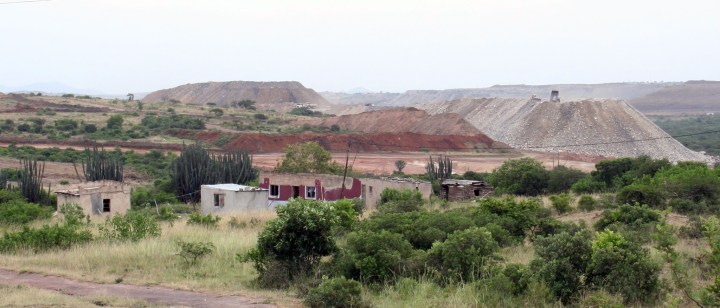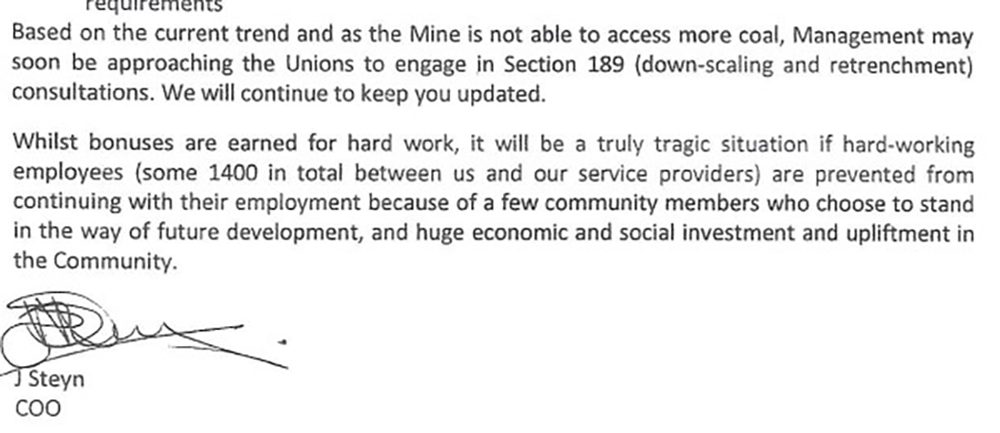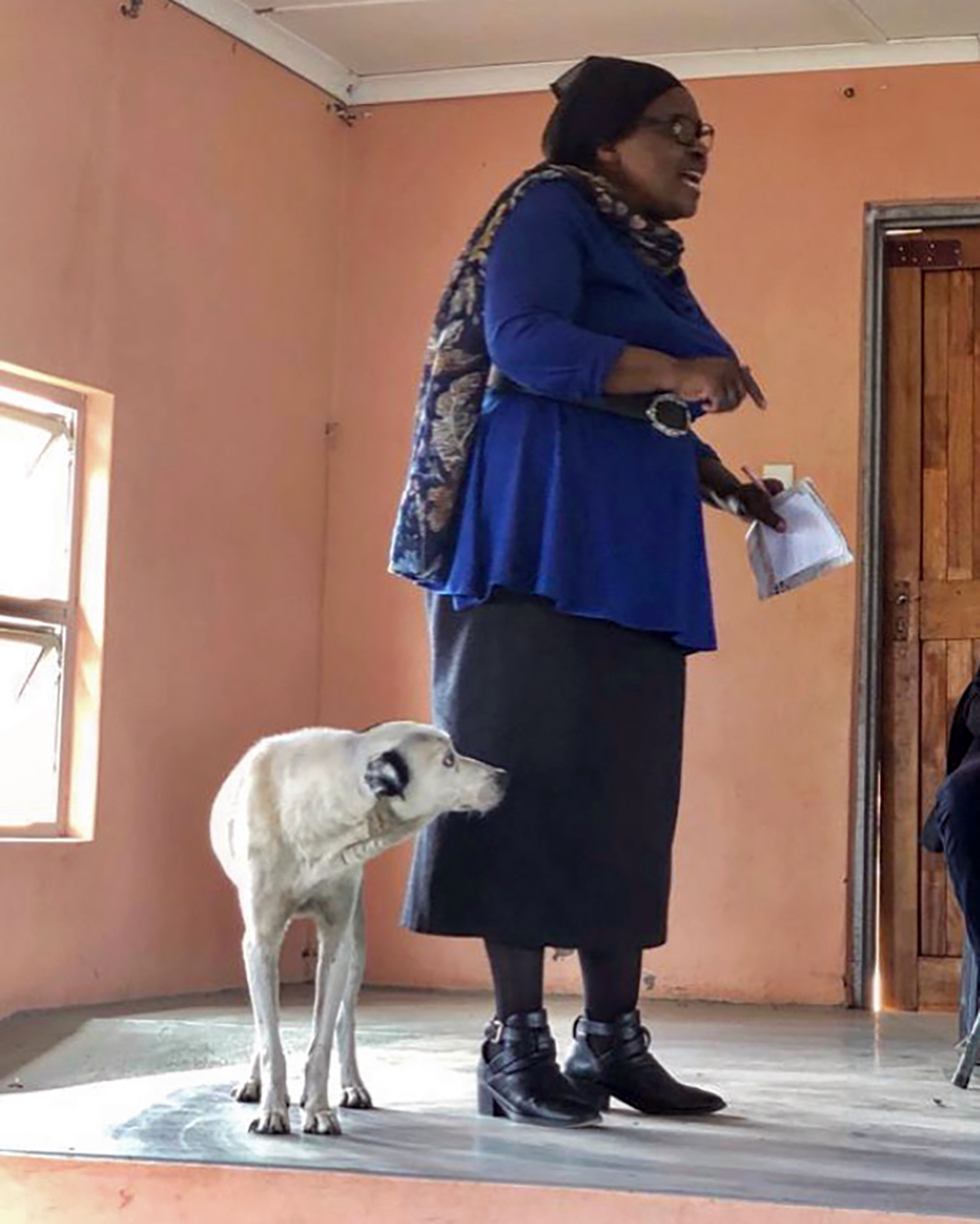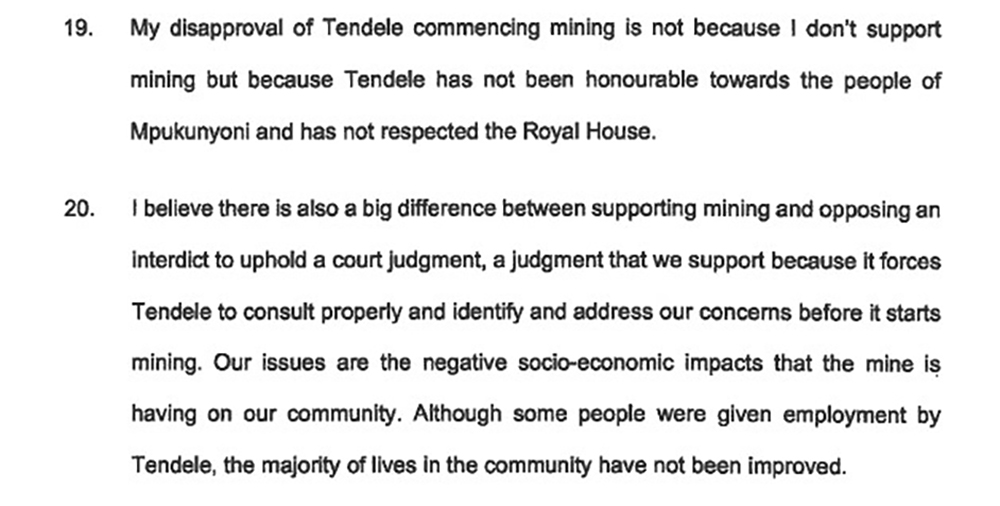PIT BATTLE
‘Wild horse’ coal company, Tendele, only has itself to blame for liquidation fears, say residents

The Tendele coal mining company has been the author of its own misfortune and potential demise after failing to comply with the legal requirements for relocating nearly 200 families while opening new coal mines in KwaZulu-Natal.
This is the view of several local community members who reject Tendele’s recent assertions that it has become the “victim” of unrelenting litigation which placed the company at high risk of liquidation.
Tendele and its holding company, Petmin (Pty) Ltd, have been in a series of court battles with the Mfolozi Community Environmental Justice Organisation (Mcejo) since 2017 over the legality of coal mining rights in the Mtubatuba area near Richards Bay.
In a recent affidavit filed in the Pietermaritzburg High Court, the company’s business development manager, Nathi Kunene, said Tendele’s funders were on the point of pulling the plug on loans and this would lead to Tendele’s liquidation. The result would be the permanent closure of the company’s Somkhele mine and loss of employment and other benefits to the local Mpukunyoni community and the broader economy.

Extract of a letter to mine staff from Tendele chief operating officer Jarmi Steyn in February 2018.
But in a responding affidavit filed on 24 April, Mcejo member Israel Nkosi counters that Tendele’s current financial woes are the direct result of its failure to comply with mining laws for nearly six years.
“We submit that this Honourable Court should not be taken in by Tendele’s repeated and ongoing pleas for assistance to keep the mine going in spite of its repeated and ongoing self-inflicted harm.
“We implore the Court not to be taken in by Tendele’s cries of being the perfect industry and partner for the community. We live in the wake of its destruction, and we know better. We implore the Court to come and see for itself the destruction that Tendele has waged on our community before accepting the easy numbers game that Tendele says it plays in the formal economy,” Nkosi said.
Instead of fixing the legal defects and public consultation failures when they were first identified several years ago, the company had vehemently defended its unlawful conduct, despite knowing that its survival depended on accessing new mining areas as soon as possible.
In a ruling last year, Pretoria High Court judge Noluntu Bam likened Tendele’s behaviour to that of an “unbridled horse” that showed little or no regard for the law.
Now, as part of the court proceedings, Mcejo members have submitted a short video clip depicting some of the assets, history and lifestyles many rural residents stand to lose if Tendele is allowed to dig two open-cast mining pits in the Ophondweni and Emalahleni rural areas.
Filmmaker Ryno Nortje, on behalf of Mcejo, recorded this six-minute video to present to the Pietermaritzburg High Court.
Produced by filmmaker Ryno Nortje, on behalf of Mcejo, the six-minute clip portrays a day in the life of the extended Shoyisa family, whose homesteads lie next to a new mine proposed by Tendele.
Tendele has vehemently denied claims that the company has directly or indirectly sought to harm or intimidate families opposed to mining, but Nkosi notes that many residents remain haunted by the October 2020 assassination of local grandmother Fikile Ntshangase, who refused to give up her home to make way for Tendele.

Murdered activist Mafikile Ntshangase. (Photo: Supplied)
In a separate document submitted to the court, community attorneys describe how two of their clients went into hiding when their homes were burnt down in March 2022, allegedly after they refused to sign relocation negotiations with Tendele.
In his affidavit, Nkosi argues that if Tendele had complied with Environmental Impact Assessment (EIA) regulations and Judge Bam’s court order, they would not be in their current financial and legal predicament.
“Tendele attempts to blame (Mcejo) for its imminent closure by claiming that ‘a healthy and commercially viable mining enterprise will have been brought to collapse as a result of the uncertainty, risk and delay entirely by litigation’.”
He says the reason for Mcejo’s court application is simple: It wants to interdict Tendele from opening new mines until it complies with the relevant laws and conducts a fresh EIA process.
Instead of answering the crisp issues before the court, Tendele was attempting to “flood the court with unnecessary papers” to obfuscate the fact that it had done very little in 12 months to overcome its failure to properly identify and consult with the affected community and comply with Judge Bam’s order.
“In reality, all of Tendele’s misfortunes are entirely self-created… In almost every instance, proceedings have been delayed due to Tendele’s failure to adhere to timelines.”
More recently, just as the latest case was due to be argued in court, the local Mpukunyoni Traditional Council and two trade unions brought applications to join the proceedings as co-respondents with Tendele.
The mine now appeared to be relying on arguments that it was the largest employer in the region, but failed to acknowledge that there were many others, including Ezemvelo KZN Wildlife, Mtubatuba Sugar Mill, iSimangaliso Wetland Park Authority, as well as government departments and municipalities, that provided far more jobs on a long-term scale than Tendele ever could.
“Tendele also fails to acknowledge the high level of self-employment in the region, including the small cane growers and subsistence farmers, and the value of the rural economy in general,” says Nkosi.
“Although this economy may not be based on formal employment contracts or paychecks, it has the inherent and time-tested resilience to survive for much longer than the short-lived mining operations at Emalahleni (two years), Ophondweni (two years) and Mahujini/Amajonjoni (six years), provided the mining does not destroy this self-sustaining economy completely.”
In short, says Nkosi, Tendele was in its current predicament because it had not managed its business well.
“They have left everything until the last minute (having regard to the long lead times in industries such as this), expecting everything to go smoothly with regard to their applications. They apparently did not plan for the opposition, despite knowing full well that there was and has been for some time significant discontent with the mine in the surrounding communities.
“Now that Tendele is called to account, it holds up inflated employment numbers as a trump card,” he concludes. DM/OBP
Cracks appear in mine community as local leaders refuse to accept new chief
The newly certified chief of the Mpukunyoni Traditional Council has asked for permission to join the court case, based on his belief that traditional leaders have a vested interest in supporting Tendele as a major employer in the area.
Ntokozo Mkhwanazi, who took over as Inkosi (chief) in a disputed leadership row in March, alleges in an affidavit that Mcejo was bent on closing down Tendele “at all costs” and “irrespective of the negative consequences that would befall the community”.
As chief and chair of the Mpukunyoni Traditional Council (MTC), he claims to represent more than 220,000 community members, along with two local trade unions and the Mpukunyoni Community Mining Forum.
Mkhwanazi argues that “97%” of households in the directly affected mining area support mining and are “ready and willing” to be relocated from their homes, whereas Mcejo represented only “about 2%” of the community.
Though “the community” had allegedly provided consent for mining back in 2006, the new chief said he accepted Judge Bam’s ruling that they now had to provide free and informed consent in terms of the Interim Protection of Informal Land Rights Act (Ipilra), and his traditional council now “accepts the responsibility of leading the Ipilra process in an indigenous land over which the traditional leadership presides”.
“There are no intentions to abdicate such God-given and government-endorsed responsibility of providing leadership,” he declares, further suggesting that “pressure on the ground is mounting” as people understood the importance of mining.
The MTC was also in full support of mining and – in line with custom – only heads of households (not individuals) were allowed to vote “to avoid confusion”.
Mkhwanazi further denies claims by Mcejo that any community members were threatened or intimidated during the voting consent process held last October, and he invited Mcejo to provide proof of their “sensational claims”.
He goes on to accuse Mcejo members and their attorneys of showing a “downright racism tendency” for apparently suggesting that the Mpukonyoni community should continue living a subsistence lifestyle.
But other community members have painted a very different story in their affidavits to the court.
Israel Nkosi, a resident of the Emalahleni area, notes that Inkosi Ntokozo Mkhwanazi’s chieftainship remains subject to a separate legal challenge. He also asks whether Ntokozo has a valid, written mandate to intervene in the court case, or has the authority to claim that he represented 220,000 people as he had not been formally introduced as chief to the people of Mpukunyoni.
Nkosi suggests it was all very well for members of the traditional council and mining forum to receive monthly stipends from Tendele, but those in the mine path would have to leave their homes and land or end up living next to open-cast mining pits.
Addison “Sikhosiphi” Mkhwanazi, a member of the Nomathiya Royal House, as well as the MTC and the local mining forum, alleges in his affidavit that Tendele had recently “engaged with certain individuals and come to agreements that affect us without consulting the Royal House or wider community”.

The Addison ‘Sikhosiphi’ Mkhwanazi affidavit.
Sikhosiphi Mkhwanazi said he was “shocked” to learn earlier this year that Tendele planned to commence mining in new areas – before the terms of Judge Bam’s court order were complied with.
He notes that Inkosi Luke Mkhwanazi had been installed as regent of Mpukonyoni after the death of the previous chief in 2019
But, unbeknown to the main members of the Royal House, the premier of KwaZulu-Natal had recently recognised Ntokozo as the new Inkosi and state officials attempted to introduce him as such to the Royal House at the Mgeza traditional council hall on 23 March.
However, royal representatives at Mgeza promptly locked the gates and refused to recognise his presence or to allow government officials to award Ntokozo with a certificate of chieftaincy. As a result, Ntokozo was forced to receive his chief’s certificate at an impromptu ceremony at the local police station in nearby KwaMsane.
Sikhosiphi said his “disapproval” of Tendele’s proposed new mines was not because he did not support mining, but because “Tendele has not been honourable towards the people of Mpukonyoni and has not respected the Royal House.
“I believe there is a big difference between supporting mining and opposing a court interdict to uphold a court judgment… a judgment that we support because it forces Tendele to consult properly and identify and address our concerns before it starts mining… Although some people were given employment by Tendele, the majority of lives in the community have not been improved.
“What use is an EIA process – or what use is community consultation – when Tendele does exactly what it wants, and the damage is done?
“As members of the Royal House, my brothers and I were very pleased that Mcejo applied for an interdict preventing Tendele from commencing with mining. We planned to do the same but lacked resources. Tendele is denying us our customary rights as the Royal House and as members of the Mpukonyoni community to have a say in what happens on our land.”
Meanwhile, the urgent court interdict originally scheduled to be heard on 4 April has been delayed to 16 May, and may now be delayed even further after recent interventions by Ntokozo Mkhwanazi, two unions and the Ingonyama Trust. DM/OBP
For tickets to Daily Maverick’s The Gathering Earth Edition, click here.


















 Become an Insider
Become an Insider
Many mining companies pay lip service to the directives contained in their EIA approvals. They leave the areas after decimating the environment and liquidate their companies so that orders to rehabilitate the mined areas cannot be adhered to. Greed drives the support for new mining licences and not the need to create sustainable communities who rely on unspoilt and uncontaminated natural resources to provide a living. I do not know this area well but aerial photographs and location maps showing the areas that are under application at the DME, are startling. I drove through the Coal Fields areas in Mpumalanga a few days ago and the destruction caused by coal mining is clearly visible from the pollution, broken roads and heaps of earth and rocks defining the landscape. I support the use of coal for the generation of electricity in the short term, but only for local consumption. A big percentage of coal is exported to China, India and Europe at a huge cost to South Africa. What long term solution does the DMR have when our environment is damaged to such a point that no food can be grown, and our water is contaminated and not fit for use by humans, animals or plants. The government is relying on the export of minerals to support the economy, but at what cost to its citizens. Well done to Mcejo for taking a stand and demanding compliance with the laws of our country.